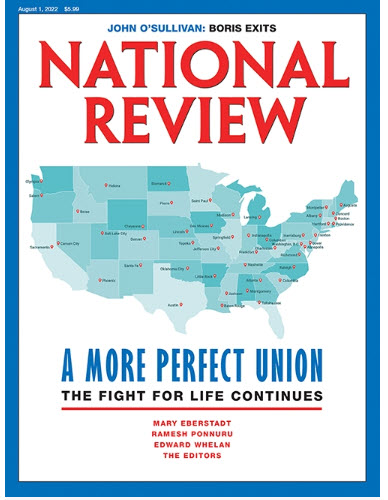The Disintegration of the United States
Conservatives were handed the long-sought grail of shrinking the federal government’s power and moving it to the states when the Supreme Court overturned Roe in June. Trigger laws that ban abortion awaited in thirteen states, eight other states enacted immediate bans, and still more plan to outlaw the procedure in varying degrees. Together they aggregate to almost half the country, setting off a The transfer of power to the states — “to the people’s elected representatives” in Justice Alito’s words in his Roe opinion — would be a return to the years before the Civil War when southern Democrats argued that the federal government had no right to interfere with state matters. In his concurring opinion, Justice Thomas voiced his opinion that the Fourteenth Amendment doesn’t provide a basis for creating new rights. That set off alarms that other rights also anchored to the amendment — the right to use contraceptives, the privacy of sexual acts, same-sex marriage — are on the conservatives’ checklist for reversal. If not banned outright, they too would be left to the states to pick and choose. Politicians joined in. Marriage should be “left to the states,” said Texas Senator Ted Cruz. Obergefell v. Hodges, the ruling that allowed same-sex marriage, was wrong, he said. Missouri Senator Josh Hawley said that he had never supported that 2015 Supreme Court decision. Marriage is nowhere in the Constitution, “and I think the states — traditionally that has been — because the definition of marriage…the states have defined it one way or another and I think that that’s the right difference”. Florida Senator Marco Rubio agreed with Hawley. Tennessee Senator Marsha Blackburn thinks Griswold v. Connecticut, the 1965 decision that cleared the privacy right to use contraceptives, was “constitutionally unsound”. Senator Mike Braun of Indiana thinks even 1967’s “Loving v. Virginia, which sanctioned mixed-race marriages, should be overturned and left for each state to decide. All above are Republicans. They seem untroubled by the dissolution of the United States into 50 Balkanized sovereignties each with its own congeries of laws, many to most in conflict with those of neighboring states. Using the phony excuse of near-non-existent fraud in the 2020 election, 27 states have introduced 148 “election interference” bills according to the Brennan Center for Justice, which tracks voting legislation around the country. That categorization covers proposals that would “create processes to overturn election results, criminalize election officials for honest mistakes, or require suspect audits of past and future elections”. Categorization as “restrictive” expands the count to 393 bills in 39 state legislatures. Going the other way, Brennan counts 596 bills that expand access to voting proposed in 44 state legislatures. The point is that all the states are going their own way, creating their own notions of democracy.
The most notable is the Texas law that permits citizens to sue anyone who helps a woman obtain an abortion with bounty rewards of up to $10,000. Beyond encouraging vigilantism, what’s remarkable is that the Supreme Court deferred to the state and let the law stand rather than staying it until it could be reviewed. States that ban abortion are now drafting laws that make it a felony for their citizens to go to another state for an abortion. Women would become citizens of the state in which they reside, bound by the laws of that state no matter where outside their state they go. No longer would they be citizens of the United States, free to avail themselves of the laws of whatever states they visit. America will be splintered into a patchwork of nation-states, its borders with neighboring states effectively closed by surveillance. As a New York Times article anticipates, those needful of abortion who travel to a state where abortion remains legal “may end up following a long list of steps to try to shirk surveillance”. They will find themselves installing VPN on their laptops, the “virtual private network” that sets up an encrypted “tunnel” for them to secretly access the Internet; using burner phones to hide their identity and thwart tracking; paying for travel in cash to avoid the trail left by credit cards. The Supreme Court’s deference to state legislatures could backfire. What if someday the justices decide such laws go too far. Will we begin to see a resurgence of the pre-Civil War “nullification” movement led by John C. Calhoun that said objectionable federal laws were to be declared null, void, and nonbinding on a state (South Carolina in that instance). Might states today begin to say, “we’re going to keep doing it no matter what the Court says”? empowering state legislatures
Constitutional originalists find justification for shifting power to the states in the Tenth Amendment, which reads, “The powers not delegated to the United States by the Constitution, nor prohibited by it to the States, are reserved to the States respectively, or to the people.” But that was to placate the original thirteen states, wary of ceding their sovereignty to a union, and ill befits a nation grown to 50 states, of wildly divergent populations, and a country with 83 times the number of souls in 1791. The conservative movement wants to see power transferred not just away from the federal government to the states, but to state legislatures in particular. We saw this in cases brought in 2019. The Court had the opportunity to at least set rules for gerrymandering in order for democracy to prevail, but it instead threw up its hands and declared that, while it would still go after racial gerrymandering, partisan political election maps drawn by state legislatures were outside its jurisdiction. Except with the Court’s new conservative members, we can forget about its stepping in against racial gerrymandering, too. A federal judge in Louisiana had ordered the map for the 2022 election be redrawn. In a state with a population one-third Black, gerrymandering gave them assumed congressional representation in only one district of the state’s six. Giving no explanation, the Supreme Court overruled the judge and let the racially prejudiced map stand. More to come: This fall the Court will hear an appeal by Republicans in North Carolina who say a state’s courts should not be allowed to order changes in federal elections or the drawing of congressional districts when they run afoul of the state’s constitution. This is “the independent state legislature doctrine”, never before considered by the Supreme Court. That the Court took the case tempts us to think the conservatives have already decided how they will vote, and that will be to hand still more power to state legislatures even though that undercuts fellow jurists. That will mean the party in power in a state legislature will be free to gerrymander the opposing party into irrelevance and perpetuate itself in control without end. Republicans already control both houses in 30 states and that could increase with the drubbing of Democrats expected in November. Dismantling the administrative state
Days after the Roe decision, the Court foreclosed the Environmental Protection Agency’s right to force states to reduce power plant emissions. This, too, will cause a shift in power to the states, which we’ll see momentarily, and not just because they no longer have to toe the mark with the EPA. (Actually, they never had too; attorneys general of 24 states sued to block Obama’s Clean Power Plan which has been tied up in the courts ever since). Much as the Court has invented a deep-rooted history and tradition test for whether a law is constitutional, they have now adopted a “major question” doctrine which says that agencies such as EPA need specific congressional approval before “asserting highly consequential power” by implementing programs with significant impact. The Court has thus given itself license to strike down whatever regulation it chooses, sure in the knowledge that the bills that authorized and funded any number of government programs lack a “specific approval” clause. The justices know — just as we all know — that Congress will do nothing to amend its many acts to give the regulatory agencies specific approval. We know it won’t because we see a gridlocked, partisan Congress do so little. The justices know it won’t from experience. They remember Shelby County v. Holder. In that case the Supreme Court stripped the 1965 Voting Rights Act of its most consequential provision. Its Section 5 subjected nine states that had been bad actors, almost all in the South, to prior approval from the Justice Department before making any change in their election laws. Parts of seven other states had also to obtain “preclearance” in advance. The law had been reauthorized four times, and with votes such as 390–33 in the House and 98–0 in the Senate in 2006, and yet just seven years later in Shelby conservatives on the bench voided Section 5. Chief Justice Roberts found it obsolete; its “formula” no longer fit. He wrote for the majority, “Congress may draft another formula based on current conditions”.
Congress never did, and that was nine years ago. The Voting Rights Act remains in its crippled state. That turned states loose to enact with few exceptions whatever laws they saw fit, from severe gerrymandering to impediments to make voting more difficult for targeted groups. With the EPA similarly hobbled — and we can expect lawsuits that seek to strike down others of the agency’s environmental programs — the states are left to pollute as they please. Politico reports that “opponents of federal actions on pipelines, asbestos, nuclear waste, corporate disclosures and highway planning are also seizing on the logic” of the Supreme Court, wondering if the intent of the six justices is to invite “major question” cases (forgetting that they are supposed to passively receive what comes to them) so as to throttle other federal agencies that impose regulations. It brings to mind when Steve Bannon first came on scene, vowing to destroy the “administrative state”. down to one branch of government
But here’s the even bigger picture. Republicans seldom vote other than as a bloc (the 65 to 33 vote for the just-passed gun law being a goosebump exception). The filibuster requirement of a 60-vote supermajority always hands control to the party that lost the election, which then blocks legislation sought by the party that won. We have a minoritarian government. It makes for an impotent Senate that leaves Congress out of the picture. And that I turn stymies an executive branch’s entreaties to Congress to enact the programs for which it was elected. We just saw that with the total collapse of Biden’s goals. Surprise! That puts the courts — the Supreme Court and the federal courts packed with conservative justices — and the state legislatures in charge. And true to conservative principle, the courts are inclined to leave the legislatures to function on their own. Dean Obeidallah, a SiriusXM radio host and Daily Beast columnist has it right, expressing a “growing sense that some Republicans don’t just want red states but individual red nations”. 
scramble for patients, medical workers, lawyers, and state officials to deal with the seismic change. The cover of the conservative National Review magazine proclaims without irony “A More Perfect Union” with artwork showing the patchwork quilt of abortion laws splintering the states into anything but a union.



